
Waste disposal in modern society has become an urgent problem that necessitates
innovative solutions. Air curtain burners and traditional incineration technologies stand out as
two promising approaches that offer waste management experts and environmental
engineers insight into their efficiency, environmental impact, and cost-effectiveness. After
reading this blog post, you will have a greater idea of which method best suits individual
needs.
Understanding Air Curtain Burners
Air curtain burners are cutting-edge technologies designed for environmentally responsible
disposal of wood waste. These units create an air curtain above their combustion chamber
that traps particulates while simultaneously lowering emissions.
Air curtain burners are an efficient means of disposing of debris resulting from land clearing
operations, storm debris removal, and agricultural waste. Their controlled combustion
process ensures higher temperatures to ensure complete destruction of waste material.
How Traditional Incineration Works
Traditional incineration is one of the oldest methods of waste disposal, consisting of burning
materials at high temperatures to reduce their volume and mass. This practice is frequently
employed when disposing of municipal, hazardous, and medical waste.
Incineration plants often employ pollution control devices such as scrubbers and electrostatic
precipitators to limit emissions. However, traditional incineration remains controversial due to
its environmental ramifications.
Comparison
Air curtain burners and traditional incineration each have distinct advantages when it comes to efficiency. Air curtain burners excel at efficiently burning wood waste while producing nearly complete combustion while significantly decreasing waste volume. Waste management experts must carefully consider the environmental ramifications of their disposal methods, with air curtain burners potentially offering reduced emissions by trapping particulates within their combustion chamber, thus decreasing pollution including particulate matter and volatile organic compounds (VOCs).
It is always important to conduct an economic evaluation when looking for air curtain burners for sale. Of course, air curtain burners offer lower operating costs compared to traditional incineration processes. They require less infrastructure and maintenance expenses compared to their counterparts, thus offering an economical option when disposing of wood waste,.
Waste disposal methods must comply with environmental regulations, and air curtain burners have long been recognized for meeting stringent emission limits while simultaneously fulfilling air quality and particulate emission requirements.
Different Needs for Different Waste Types
Air curtain burners provide an efficient method for burning wood waste but are limited in their
application due to being unsuited for burning mixed municipal waste or hazardous materials.
Traditional incineration offers more flexibility, making it suitable for municipalities and
industries managing multiple waste streams. Also, air curtain burners are often considered
safe due to their controlled combustion process and reduced risks associated with
uncontrolled fires spreading more rapidly.
Conclusion
Selecting an efficient waste disposal method involves several considerations, including
waste type, environmental impact assessment, cost, and regulatory compliance
requirements. Air curtain burners and traditional incineration have their own set of benefits
and drawbacks that should be carefully considered beforemaking a decision.
Waste management professionals and environmental engineers must recognize these
variations to make informed decisions regarding modern waste disposal methods. Each
method offers its own set of benefits in terms of efficiency, environmental sustainability, or
cost effectiveness. Making a knowledgeable selection is essential to successfully disposing
of waste.
For additional insight and understanding of how these technologies could add value to your
operations, it may be worth consulting industry specialists for guidance.
